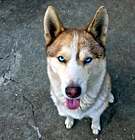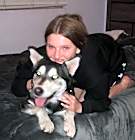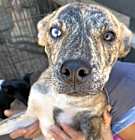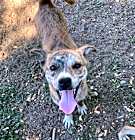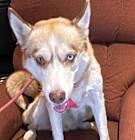Color
White - with Black
Size
(when grown) Large 61-100 lbs (28-45 kg)
Details
Not good with kids
Not good with dogs
Not good with cats
House-trained
Spayed or Neutered
Shots are up-to-date
Story
Meet Badb!
A lively one-and-a-half-year-old Siberian Husky and German Shepherd mix from Tacoma, WA, whose compact frame holds a whirlwind of energy, curiosity, and heart-melting charm.
Born into a bustling litter of seven, her creamy black coat, striking eyes, and perked ears give her a unique look that turns heads on every walk. She’s got a serious love for all things active—balls, chew toys, running at full speed, and then curling up like a queen in her favorite chair to recharge!
Badb is already house-trained and crate-trained, though she’s still learning to navigate her feelings when left alone. She’s a classic “velcro dog,” happiest when she’s close to her people, and she may need a bit of patience and reassurance when it comes to separation. With positive reinforcement and a steady routine, this little lady is sure to grow into a confident and secure companion.
She knows basic commands like “sit” and “lay down” and is eager to learn more—especially if treats and praise are involved! True to her breeds, Badb is high energy, extremely intelligent, and thrives with physical activity and mental stimulation. A fenced yard is a must, as she needs space to sprint and explore safely.
Badb is selective with her canine companions—she’s great with her brothers, but she’s decided she’s not so fond of her sisters. Because of this, she may be most compatible with male dogs after careful introductions. Her feelings about cats are still a mystery, so slow intros would be best there. With people, though? She’s a sweetheart—timid at times, but always eager to connect.
Badb is looking for a guardian who can match her energy, provide gentle guidance, and, most of all, be her best friend! Could your heart and home be the one she’s been waiting for?
If you think you're ready for a loyal running buddy with a big personality in a fun-sized package, reach out to adopt@joyfulpets.com! Could Badb be the spirited sidekick your adventures are missing?
Badb has a couple of littermates who are also looking for new loving homes—just in case you're considering adopting more than one pup!











